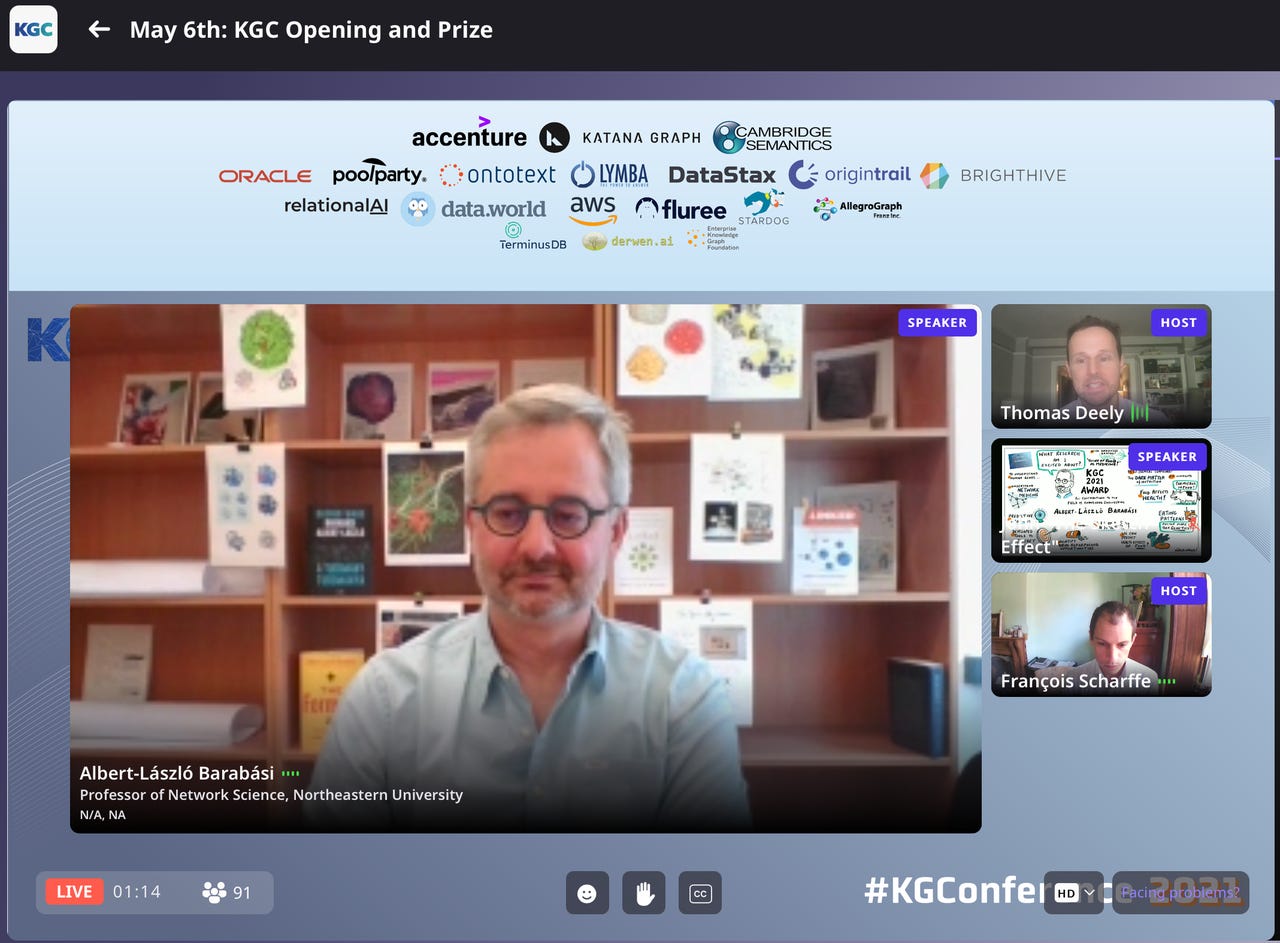The Knowledge Graph expands as discipline’s conference spreads its wings


Northeastern University professor and best-selling author Albert-László Barabási, who has popularized the graph approach to knowledge in books such as Linked and Bursts, was a recipient Thursday of the Conference's lifetime achievement award.
Knowledge graphs are an area of data science concerned with relationships between things. And so it is perhaps no surprise that the relationships between the practitioners of the art keep expanding.
The Knowledge Graph Conference, a gathering of graph enthusiasts that began as a couple hundred people in a ballroom at Columbia University in 2019, is now in its third year, with big sponsorship, including Amazon, and a much-extended program.
What was a single-track, two-day program has blossomed into a four-day gathering of talks, workshops, tutorials on all manner of topics, with over 1,000 people participating from 50 different countries. As was the case last spring, the conference is entirely virtual this year.
"We had set 1,000 attendees as an ambitious goal," said François Scharffe, a co-creator and now a partner in the sponsoring organization, in an email to ZDNet.
"In virtual events, folks tend to sign up at the last minute, and we were definitely surprised to see the flow of registrations, about 100 per day the last week," said Scharffe. The conference ended up at 1,086 attendees in total.
The strong interest by speakers lead Scharffe and team to create additional tracks for the conference.
"We were hesitant to do that, as we were concerned it would change the special feeling that gave a sense of community to the first two events," he said. "Fortunately, we have seen a lot of interaction between attendees and great feedback from folks saying they have finally found the place to meet with knowledge tech peers."
The conference program opened with two days of workshops and tutorials on Monday and Tuesday. They included tutorials introducing the basics of an enterprise knowledge graph, such as how the approach can improve upon relational databases. A number of workshops invited presentations about how graphs can shed light on relationships in domains such as health and policy.
A workshop on "knowledge graphs for social good," for example, explained using graphs to "connect the dots between funds and registered entities" pertaining to the United Nations sustainable development goals.
The latter two days were taken up with invited speakers. Topics ranged from special hardware for processing graphs — it's coming, according to Dan McCreary of the Advanced Technology Collaborative at Optum, a division of health insurance giant UnitedHealth.
There were presentations about using knowledge graphs for drug discovery, by drug giant AstraZeneca among others, and talks on the use of the technology in finance. There were presentations from sponsoring companies, such as Oracle discussing how to use knowledge graphs in Oracle DB, and also presentations about knowledge graphs developed in conjunction with artificial intelligence applications such as natural language processing and blockchain technology.
Thursday featured a soaring presentation by a master of the graph, Northeastern University professor and best-selling author Albert-László Barabási, who has popularized the field in books such as Linked and Bursts.
Barabási explained how society can use graphs to map the "dark matter" of nutrition, the way that ingredients interact with proteins in the body and set off chain reactions. Barabasi was a recipient of the conference's KGC Lifetime Achievement award.
All sessions took place via the Airmeet platform, with Scharffe and co-founder Thomas Deely introducing speakers and moderating Q&A sessions. In addition, there was a lively level of engagement on Slack. Slack has in fact become part of the year-round community-building effort since last summer, when the channel was made full time, said Deely. There are now over 1,500 individuals on the channel. (You can join the Slack channel at any time right here.)
Also: Uber's graph expert bears the scars of billions of trips
Scharffe holds the role of conference chair, while Deely is head of partnerships for the conference, and they have a small team of organizers helping them, as well as a program committee.
Scharffe previously served as a senior lecturer in data analytics at Columbia, while Deely had been executive director for corporate partnerships at the University.
Both have left the University to focus exclusively on the conference.
"The success of the first conference highlighted the demand for an industry-focused event," Deely told ZDNet via email.
"Our focus as we grow is continuing to provide the personal community experience, and support new connections and networking, and continuing to showcase the interesting innovations in the space, be a force in driving industry adoption, and in particular many of the social good applications."
"The Knowledge Graph Conference has become a force to be reckoned with," according to a prepared statement offered by Ora Lassila, who is a principle technologist at Amazon Neptune, and who has become a leader in the Knowledge Graph community.
A side benefit of the virtual nature of things was that the conference was able to lower costs, "and pass that on in a lower ticket price to attendees," said Deely.
Deely, who hails from Ireland, was glad to see extensive participation by European sponsors, speakers and attendees. They include TerminusDB of Dublin, and Bulgarian startup Ontotext. The increased sponsorship is another sign of the growth of the event. This was the first year Amazon was sponsoring, for example.
A subscription archive of sessions is planned to be put online in the near future.
Given the strong international participation, Scharffe said the organizers are planning a "hybrid event" next year.
"We project it as one event where speakers and attendees can gather in multiple locations across the world," he wrote in email. The Knowledge Graph Conference is seeking partners for that initiative, he said.